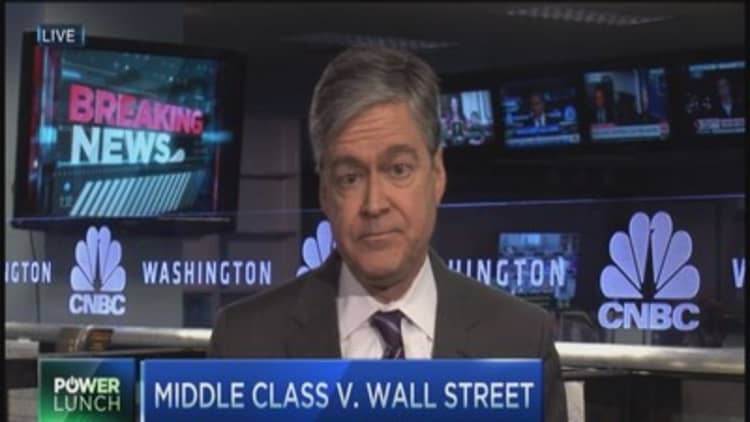
The political debate over raising middle class incomes is gathering momentum, with significant potential consequences for Wall Street and Main Street alike.
It will be most consequential in the 2016 race for the White House, as President Barack Obama's would-be successors lay out their approaches to rising inequality and the stagnation in average family incomes while the most affluent Americans keep doing better. Republicans and Democrats from Jeb Bush to Hillary Clinton acknowledge the problem. One measure: Median family income, which more than doubled from 1947 to 1979, has risen by just 9 percent since 1979.
Meantime, the skirmishing takes place on Capitol Hill, even amid widespread skepticism that Congress and the president can reach agreement on major steps before Obama leaves off. On Monday, Rep. Chris Van Hollen of Maryland, the top-ranking Democrat on the Budget Committee, laid out a plan embodying his party's core approaches to the issue.
Read MoreDemocrats to propose tax break for middle class
Van Hollen would give Americans earning below $100,00 a "paycheck bonus tax credit" of $1,000 per year. It would add to that a $250 "saver's bonus" for those who apply at least half of their paycheck tax credit toward a tax-preferred savings plan. In addition, the plan would more than double an existing $3,000 credit for child care expenses.
To finance those benefits, the plan would target high income Americans and businesses in two ways. One is by unspecified reductions in tax benefits for those in the top 1 percent of family incomes. The other is what Van Hollen calls a "high roller" fee on financial market transactions.
In addition, the plan would give businesses incentives to raise middle-class pay. Current law makes certain types of executive compensation over $1-million, such as stock options, tax-deductible. Van Hollen would bar companies from claiming those deductions unless workers receive pay increases tied to productivity gains and inflation. In addition, deductions for executive stock options and executive pay would be conditioned on providing similar incentives to rank and file workers.
Read More
"If a corporation is doing well enough to give its executives big bonuses, it should be giving employees a raise," Van Hollen said in a speech at the Center for American Progress. "So this bill is very simple. No raise for workers, no corporate tax breaks for executive bonuses."
The bill has no chance of passing the Republican Congress. But it does establish a starting point for dialogue that will increase pressure on Republicans to respond. Republicans have been loath to offer the sorts of direct large-scale redistribution Democrats favor.
Still, enthusiasm for their traditional prescription of personal income tax cuts has faded. Now Republicans emphasize corporate tax rate reduction as a key to rising wages. Some "reform conservatives" also advocate higher child tax credits and earned income tax credits, though there remains no consensus approach within the party.


